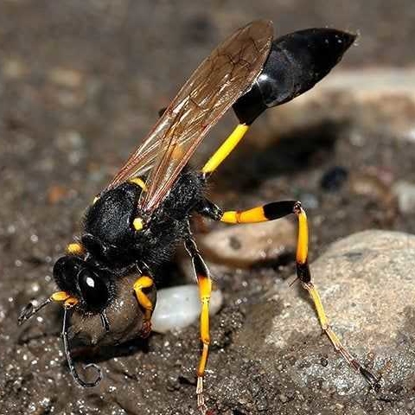
Stinging Insects

About
What are stinging insects?
Living in our region are a variety of stinging insects. Stinging insects all have stingers extending from the abdomen they use for hunting and defense. The most common stinging insects in our region are predators and play an important part in the ecosystem, helping control numbers of nuisance insects; they are also responsible for some pollination.
Stinging insects are in one of two groups: social or solitary. Social stinging insects live together in large groups and tend to be more aggressive than solitary stinging insects whose females create individual nests. We regularly deal with wasps, yellow jackets, and solitary stinging insects like cicada killers and mud daubers in our region.
Are stinging insects dangerous?
However helpful stinging insects are when out in nature, when they move into our yards or, worse yet, our homes, they become dangerous unwanted pests. Stinging insects will defend themselves and their nest by delivering painful stings filled with venom. Their venom is potent enough to trigger an allergic response in people. Depending on the severity of the allergy, symptoms can range from mild swelling around the sting site to anaphylaxis.
Why do I have a stinging insect problem?
Stinging insects have become a problem on your property because it offers them suitable nesting sites and easy access to food sources. These flying pests are very mobile and will make their way to any outdoor space that provides them with their basic needs. All of our yards are likely to become home to stinging insects at one point or another.
Where will I find stinging insects?
Stinging insects will build a nest in any sheltered spot. Some species like cicada killer wasps and yellow jackets like to create ground nests, while others like wasps and mud daubers prefer to nest up off the ground.
Some places where we regularly find stinging insect nests in California yards include the following:
- Tree branches
- Tree stumps
- Woodpiles
- Ground holes in grassy yards
- Under decks
- Roof eaves or the corners of doorways or windows
Sometimes stinging insects will exploit an opening they discover in a home’s exterior and create a nest within the safety of a wall void, chimney, or attic.
How do I get rid of stinging insects?
Stinging insects are outdoor pests that can find their way into any of our California yards. Take back your property from these dangerous pests by partnering with a local professional. At Hangtown Pest Control, our highly trained and experienced professionals will provide you with the services needed to safely remove stinging insects from your yard and, if need be, your home.
If you would like to learn more about eliminating stinging insects from your Placerville area residential or commercial property, reach out to us today!
How can I prevent stinging insects in the future?
In addition to our home pest control and commercial pest control services, protect your property from pests with the following prevention tips:
- Regularly complete yard work to keep the grass cut short, remove debris, and keep shrubbery and trees from overgrowing.
- Fill in ground holes in your yards and garden areas.
- Repair gaps around windows and doors.
- Place caps on chimneys.
- Limit the amount of flowering vegetation planted near your doors and windows or outbuildings like garages and sheds.